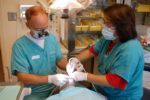Table of Contents
- What Is Autism Spectrum Disorder?
- How Does ASD Affect the Dental Health of Children?
- Do Children Get Dental Decay Because of Their Autism?
- How Autism Disorder Can Affect Play
- Early Periodontal Gum Disease
- Teach Children with Autism to Brush Their Teeth
- Electric Three-Sided Toothbrush for Autism Spectrum Disorder
- Problems Facing Children on the Autism Spectrum
- Preparing a Child with ASD for a Dental Visit
Children with autism often experience sensitivity to touch, light, and sound. For these and other reasons, routine dental visits and practising good oral health may be challenging. Taking each child’s needs in mind, family members and dental professionals can provide them with the skills necessary for good oral health.

What Is Autism Spectrum Disorder?
Autism Spectrum Disorder (ASD) is a condition related to brain development that impacts an individual’s perceptions and socialisation with others, causing issues in social interaction and communication.
The disorder also includes restricted and repetitive patterns of behaviour and limited interests or activities.
Symptoms of ASD are seen as early as the first year, followed by a period of regression between 18 and 24 months. The severity and variety of symptoms vary greatly in each child, as do patterns of impairment and behaviour.
Some children with autism have learning difficulties and are considered low-functioning, while others learn quickly and have higher than average intelligence and are considered high-functioning. According to the Mayo Clinic, the unique mixture of symptoms in each child, severity can sometimes be difficult to determine.
How Does ASD Affect the Dental Health of Children?
While the symptoms vary drastically in those who have Autistic Spectrum Disorder, there are difficulties that they experience at a much higher rate than people without ASD. One of these difficulties is maintaining dental health. There are numerous dental problems children with Autism Spectrum Disorder often experience.
- 20-25% of children with ASD have bruxism, which is a condition in which they grind their teeth.
- Children with Autistic Spectrum Disorder also often suffer from non-nutritive chewing or Pica, where they digest items that are not food. This can include ice, drywall, hair, etc.
- Children with ASD have a higher likelihood to suffer from tongue thrusting or reverse swallow. This is a dysfunctional muscle pattern in which the tongue protrudes laterally during swallowing. This can affect speech, eating patterns, and even the ability to close the lips completely.
- Those who have ASD are more prone to self-injury, which can result in ulcerations and damage to the teeth and gums.
- Many children with ASD have very limited dietary preferences and, therefore, do not eat enough fruits and vegetables.
Do Children Get Dental Decay Because of Their Autism?
No. ASD is a developmental disorder, so it is not the cause of dental decay. However, children with ASD have a significantly higher rate of decay, damage, and missing teeth than those without ASD.
With proper preventative measures, parents and dental professionals can greatly improve the dental hygiene of children with ASD. If your child has autism and shows signs of advanced tooth decay, consult with a dentist for advice on how to better care for their immediate dental needs.
How Autism Disorder Can Affect Play
Playing is one of the most critical components of healthy childhood development. While children with autism spectrum disorder (ASD) enjoy playing, they can often have difficulty with certain types of play.
Some essential parts of gameplay may be challenging for someone with autistic spectrum disorder. It may be hard for children with autism to share objects, take turns, respond to others, and copy/follow instructions. These same obstacles in play can make visiting a dentist or doctor stressful and confusing.
However, with your help, your child can develop the skills needed for enjoyable and beneficial gameplay, which can provide them with essential skills for visiting a dentist.
According to Marcus Autism Center, kids with autism need to learn and improve their play skills to create a foundation for other essential life skills.
One of the best ways to achieve this goal is to take time to play with your child even if they seem disinterested or adverse to it at first. Don’t stress if your child shows interest in only one topic. Use their current interests to spark interest in gameplay.
For example, if your child is only interested in robots, then use their favourite transformer as a way to introduce new toys.
There are six types of play skills that children engage in. Helping your child with autistic spectrum disorder learn these skills can help develop a healthy dental routine.
- Exploratory Play
In exploratory play, children investigate their toys rather than play with them. A good way to introduce your ASD child to exploratory play is at home in a quiet area. Guide them through the different aspects of their toys and answer their questions.
Your child may want to explore the different tools and instruments of a dental practice. Schedule a quiet time after-hours with your dentist in East London so your child can explore the exam room before their visit.
- Cause-and-effect Play
This is when children play with toys that have buttons, or lights, or sound effects that cause an action. Encouraging your child when they correctly perform an action is a great way to motivate them to continue this style of play. In a dentist’s chair, there are many tools with buttons and sounds. With proper supervision, your child can explore these causes-and-effects to become more comfortable with their dental exams.
- Functional Play
Functional play is when a child correctly utilises a toy’s intended function. A child with ASD may have trouble with this, but there are several ways to help them overcome this hurdle.
For example, limit the number of toys so they don’t get overwhelmed. Sit with your child so they may see what you’re doing. A dentist who is skilled in working with children with ASD will know to introduce each instrument one at a time.
This gradual introduction and praise when the child uses a tool correctly can help relieve anxiety and confusion.
- Constructive Play
This is when a child creates, builds, or works toward an objective. Some children with ASD will excel at this more than others. If your child struggles, try completing the task in front of them or showing them a video of how the task is completed.
Your dentist may have videos or finished models in the practice that they can use to show your child what the process of a dental treatment looks like. This can help alleviate your child’s anxiety during their treatment.
While physical play is also important to developing important social and coping skills, focusing on constructive, functional, cause-and-effect, and exploratory play can lend your child valuable skills for dealing with a variety of real-life situations.
Learning to cooperate with others may help your child better cope with future dental visits.
Early Periodontal Gum Disease
Periodontal gum disease is a common condition that damages the soft tissue and bone that support your teeth. Symptoms include swollen or sensitive gums that bleed easily and loosening teeth.
For those with autism who already suffer from periodontal gum disease, brushing teeth two times a day, flossing, and periodic visits to a dentist make successful treatment possible.
Teach Children with Autism to Brush Their Teeth
A genuine dislike of sensory stimulants makes dental hygiene a struggle for children with autism. Each parent of an autistic child knows what they can tolerate, but don’t feel bad if you seem lost while trying to establish a dental routine.
This is a common struggle for parents of autistic children. Individualising a dental routine can be easier than you think.
The American Speech-Language-Hearing Association (ASHA) suggests creating a visual brushing and flossing schedule with defined times. Get your child involved by allowing them to select their toothbrush from a few options. A toothbrush with a wider handle is best, and the bristles should be soft. Get a mild-flavoured toothpaste that isn’t as strong as mint. Allow them to brush their teeth with your hand, guiding to all important areas. Singing a song is often very helpful in reducing anxiety surrounding dental care for children with autism.
Electric Three-Sided Toothbrush for Autism Spectrum Disorder
An electric three-sided toothbrush is a perfect tool for those with ASD. With three sides, it cleans the front, back, and biting surface of teeth at the same time for complete tooth coverage.
This ensures a clean mouth in the fastest time available. This is also easy to use for parents who have to brush their child’s teeth. With some gentle guidance from your dentist, you can successfully incorporate an electric three-sided toothbrush into your child’s oral hygiene routine.
Problems Facing Children on the Autism Spectrum
Children who have Autistic Spectrum Disorder often unable to communicate socially. Restrictive and repetitive behaviours can lead children with ASD into inflexible rituals.
Young autistic people often struggle with cognitive problems including concentration and comprehension. Children with ASD often suffer from neurological disorders such as dyspraxia and epilepsy.
With the expansive list of challenges facing children with autism, it is important to make good dental hygiene habits both enjoyable and attainable.
Preparing a Child with ASD for a Dental Visit
When it is time to bringing children with autism to the dentist, ensure to plan ahead. Discuss any medications your child is taking with your dental office before your visit. Additionally, discuss any special sensitivities your child may have.
Sometimes, sedation may be available if considered medically necessary. Getting your autistic child into a hygienic routine may seem daunting, but with repetition and practice, your child can learn healthy dental habits.







